Civil Liberties, Criminalizing Dissent, Human Rights, Surveillance
Podcast: Play in new window | Download
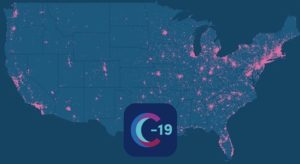
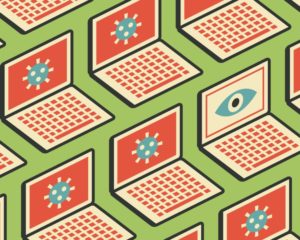
EFF: Google And Apple Virus Contact Tracing And Privacy
From China, to Israel, and now the U.S., governments seek to enact broad surveillance measures to contain the spread of COVID-19. Already a majority of the public has said it favors such tracking, even though leadership has not shown how this tracking might actually stop the spread. According the Electronic Frontier Foundation, the measures must quote “be scientifically rigorous, and based on the expertise of public health professionals.”
Absent such a showing, many believe it’s too early to warrant the privacy intrusion this surveillance would bring, with uses we may not be able to foresee.
In a rare collaboration, tech competitors Google and Facebook have collaborated in creating a tracking app. It allows users to voluntarily share data through Bluetooth Low Energy transmissions and approved apps from health organizations. It would keep extensive data on phones that have been in close proximity with each other. Official apps from public health authorities will get access to this data, and users who download them can report if they’ve been diagnosed with COVID-19. The system will also alert people who download them to whether they were in close contact with an infected person.
Guest- Senior Staff Attorney Adam Schwartz from the Electronic Frontier Foundation. Adam’s legal expertise on surveillance includes such areas as warrantless smartphone searches, location tracking, warrantless smartphone searches at the borders, and biometric surveillance. Adam worked at the ACLU of Illinois for 19 years, and clerked for Judge Betty B. Fletcher of the U.S. Court of Appeals for the Ninth Circuit.
—-
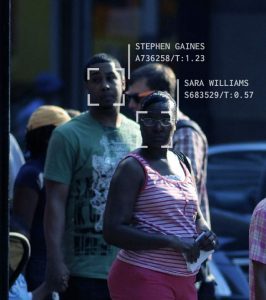
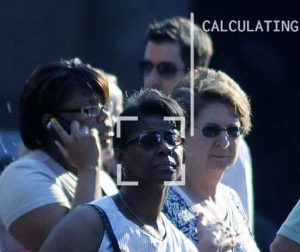
Perpetual Line Up: Unregulated Police Face Recognition In America
The presence of surveillance cameras across the United States has enabled targeted facial recognition surveillance at essentially any place and any time. Each day law enforcement puts in place more and more cameras, including CCTV cameras, police body cameras, and cameras on drones and other aircraft. The FBI’s Next Generation Biometric Identification Database and its facial recognition unit, FACE Services, can search for and identify nearly 64 million Americans, either from its own databases or through access to state DMV databases of driving license photos.
It’s likely that government agencies will soon be able to pinpoint your location and even with whom you’ve been, just by typing your name into a computer.
The release of Apple’s IPhone X has drawn scrutiny to this technology. Despite civil liberties and privacy concerns, there are few limits on facial recognition technology. In March 2017 Congress held a hearing to discuss the risks of facial recognition surveillance. There is concern that facial recognition can be used to get around existing legal protections against location tracking, opening the door to unprecedented government monitoring an logging of personal associations, including protected First Amendment-related activities. Knowledge of individual’s political, religious and associational activities could lead the way to bias, persecution and abuse.
As with many technological advances, there are benefits, too. Facial recognition can assist in locating missing persons or for other public safety purposes.
Guest – Clare Garvie, Clare is a Law Fellow at the Georgetown Law Center on Privacy and Technology. Her research with the Center is on face recognition use by law enforcement and the disparate impact of payday lending on vulnerable communities. She worked on the Center’s 2016 report on facial recognition technology.
—————————————–

—————————————–
Civil Liberties, Criminalizing Dissent, Human Rights, NSA Spying, Surveillance, Truth to Power
Podcast: Play in new window | Download
Host Updates:
- In Memoriam – Perry Rosenstein Law and Disorder warmly remembers Perry’s legacy. He passed on April 3rd, 2020 in Teaneck, New Jersey.
- Navy Secretary’s Flight To Aircraft Carrier To Bash Fired Captain Cost Taxpayers $243,000
- 10,239 Elderly Prisoners in New York State – Governor Cuomo’s Office – 518-474-8390
—-
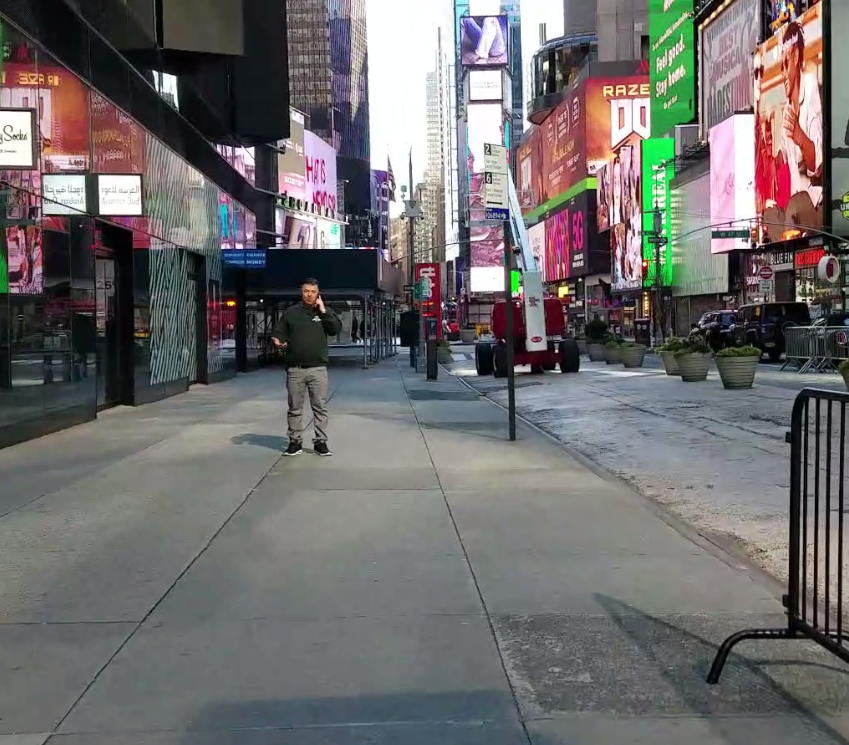
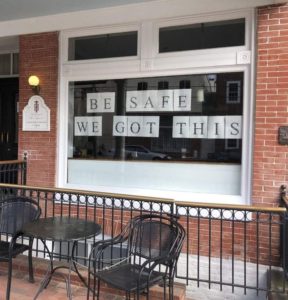
Reevaluating “Normal” Once Again
We are into a new economic and political period.The economic crisis has been looming and was predicted. But the COVID-19 pandemic triggered it. There will be no going back to “normal.“
Arundhati Roy has written that “historically pandemics have forced humans to break with the past and imagine the world anew. This one is no different. It is a portal, a gateway between one world and the next.”
As Reverend William Barber recently wrote, “this virus is teaching us that from now on living wages, guaranteed healthcare for all, unemployment and labor rights are not far left issues, but issues of right versus wrong in life versus death.“
That there will be changes when this crisis has passed is a certainty. The pendulum will not swing back to what was called “normal.” What is uncertain is what kind of changes will take place and will they be done to us or by us and for us.
Guest – Phyllis Bennis is a fellow of the Institute for Policy Studies, where she is she is the director of the New Internationalism Project and works on anti-war, US foreign policy and Palestinian rights issues. She has worked as an informal adviser to several key UN officials on Palestinian issues. Her books including Calling the Shots: How Washington Dominates Today’s UN, and Understanding the Palestinian-Israeli Conflict.
—-
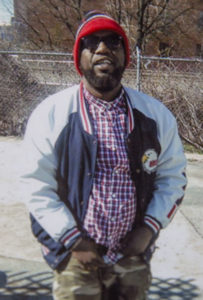
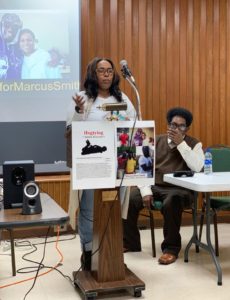
A Victory In The Greensboro, North Carolina Case of Marcus Deon Smith
On March 25, 2020 North Carolina federal judge Loretta Biggs allowed a civil rights lawsuit over the hogtying death of Marcus Deon Smith to move forward.
Smith, a young black man, was killed by eight Greensboro police officers and several emergency medical technicians during the 2018 North Carolina Folk Festival.
Hogtying is when a persons’ hands and feet are tied together behind their back. Smith’s hogtying was ruled a murder by the state medical examiner.
The Smith family is being represented by North Carolina attorney Graham Holt and Ben Elson and Flint Taylor of the PLO, The People’s Law Office, based in Chicago.
“This is an outstanding and long-awaited victory for the Smith family“, said Taylor. “It recognizes that the use of brutal hogtying of defenseless persons is a clear violation of their constitutional rights and that the Greensboro police were woefully and inadequately trained in using restraints which were a direct cause of Marcus‘s death.“
Marcus‘s mother Mary Smith thanked the judge for allowing the case to go forward. His father said in tears that he will forever be haunted by seeing his son taking his last breath on the street pavement.
Guest – Attorney Flint Taylor, one of the premier police abuse lawyers in the country. Attorney Taylor is the author of the recently published book “The Torture Machine: Racism and Police Violence in Chicago.“ Flint Taylor, welcome back to Law And Disorder.
——————————–

——————————–
CIA Sponsored Terror, Civil Liberties, Habeas Corpus, Human Rights, Political Prisoner, Prison Industry, Supreme Court, Surveillance, Truth to Power
Podcast: Play in new window | Download
Hosts Updates
- Chronic Underlying Conditions: Vunerability To Covid-19
- 10,239 Elderly Prisoners in New York State – Governor Cuomo’s Office – 518-474-8390
- FOIA Suspended
—-
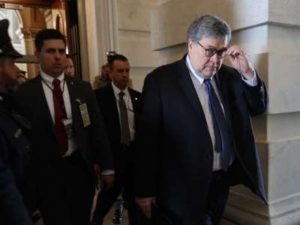

Abuse Of Emergency Powers, The U.S. Constitution And Habeas Corpus
The Department of Justice is now seeking to exploit the coronavirus calamity to get Congress to give it permission to pick up and detain people indefinitely.
At this point the American people have a constitutional right, if arrested, to be brought before a judge and informed of the charges against them so that they may defend themselves. This is known as the right of habeas corpus. It is a right that has its origins in the Magna Carta, the great charter, a British law that goes back to the 13th century. The right of habeas corpus is written into the American Constitution and can only be suspended by Congress.
Historically both the American and the German fascist government led by Adolf Hitler have used crises and the fear that crises generate in the population to expand their powers.
Abraham Lincoln suspended habeas corpus during the Civil War. FDR put 110,000 American citizens of Japanese origin into concentration camps during World War II.
In Germany, Adolph Hitler, who was legally appointed chancellor, used the shock of the Reichstag fire, which had burned down the German parliament, to get his Enabling Law passed. This enabled Hitler, with the support of German big business, to make laws on his own, bypassing the legislature.
What dangers do we face with Donald Trump as president? What does it mean to suspend the right of habeas corpus for the American citizens who oppose Trump and his big business backers.
Defend.Wikileaks.org
Guest – Attorney Marjorie Cohn, professor emerita at Thomas Jefferson School of Law where she taught for 25 years. The former president of the National Lawyers Guild and criminal defense attorney is a legal scholar and political analyst who writes books and articles, and lectures throughout the world about human rights, US foreign policy, and the contradiction between the two. She writes weekly articles for Truth out in the series Human Rights and Global Wrongs. She is currently taking a leading role in the defense of Julian Assange. She has testified before Congress and debated the legality of the war in Afghanistan at the prestigious Oxford Union. MarjorieCohn
—-
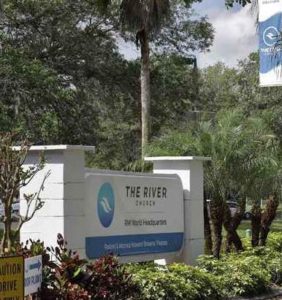
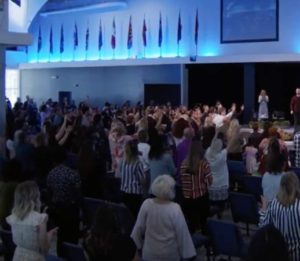
The Religious South, and Religious Exemptions to Public Health Directives
Last week sheriffs arrested Rodney Howard-Browne, the head of the River at Tampa Bay church in Florida for ignoring local orders against mass gatherings due to the COVID-19 pandemic and for showing “reckless disregard for human life.”
Hillsborough County Sheriff Chad Chronister said he had no choice but to take action against the pastor. “His reckless disregard for human life put hundreds of people from his congregation at risk and thousands of residents who may interact with them this week.” The Sheriff said his office had direct contact with the church, telling it not to pack its pews. Instead he said, the Pastor was encouraging his large congregation to meet at his church.”
Howard-Browne said his church has an absolute, constitutional right to gather for worship. He told his congregation that the church is an essential service.
But religious exemptions during the pandemic will only worsen it and claim more lives. Yet that’s precisely what government officials are doing—ignoring public health warnings and refusing to call on houses of worship to close. Establishing religious exemptions—in this case, by freeing houses of worship from public health order compliance—will only result in more cases of COVID-19 and greater numbers of death cases.
Guest – Attorney David Gespass is a former president of the National Lawyers Guild. He practices law in Birmingham, Alabama.
————————

————————
CIA Sponsored Terror, Civil Liberties, Human Rights, Prison Industry, Surveillance, Truth to Power
Podcast: Play in new window | Download
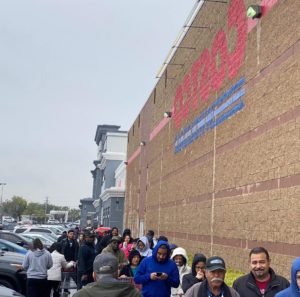

Now Is The Time To Fundamentally Transform America
Doug Henwood wrote in a Jacobin magazine article last week that “. . . things could get very ugly, but it is also an opportunity to emerge from this crisis a better country.“
In his article Henwood articulates a vision, “a vision of solidarity and mutual care.“ He believes that millions of lives depend on that. LBO-News.com
Guest – Doug Henwood, his fields of expertise are politics, economics, and finance. He is the publisher of “The Left Business Observer.” Henwood has written four books. His articles have appeared in “The Nation”. the “Los Angeles Times, and “the Guardian“. He hosts the radio show Behind the News each week on the Pacifica station KPFA in Berkeley.
—-
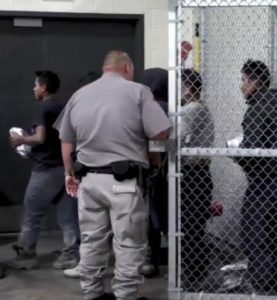
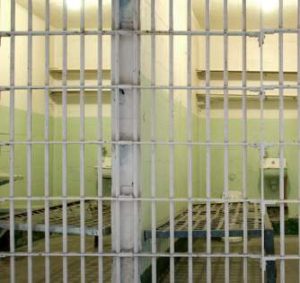
Aging Prisoners And Prisoner Release During Pandemic
Last week, New York City jails were among the country’s most infected by the virus so far, with at least 38 people testing positive at Rikers Island. Another inmate, became the first in the country to test positive in a federal jail.
In a letter to New York’s criminal justice leaders, Board of Correction interim chairperson Jacqueline Sherman described a jail system in crisis. She said that 12 Department of Correction employees, 5 Correctional Health Services employees, and 21 people in custody at Rikers and city jails had tested positive for the coronavirus.
And at least another 58 were being monitored in the prison’s contagious disease and quarantine units, she said. Across the nation, several large county and municipal jurisdictions have freed thousands of low-risk inmates from jails, including seniors and those in poor health.
New Jersey plans to release as many as a thousand people from county jails, including inmates jailed for probation violations and those sentenced for low-level offenses. Mayor Bill de Blasio said last week that New York City may release more than 200 inmates. Los Angeles County and Ohio’s Cuyahoga County also have released prisoners.
Prisoner advocacy groups in more than a half-dozen states, including Texas, New York, Illinois, Pennsylvania, Indiana and Michigan, continue to urge governors to release state prisoners, especially elderly inmates, through compassionate release or medical furlough.
Guest – Victor Pate, the New York statewide organizer for the Halt Solitary campaign. That stands for humane alternative to long-term isolated confinement.
——————————

——————————
Civil Liberties, Habeas Corpus, Human Rights, NSA Spying, Supreme Court, Surveillance, Truth to Power
Podcast: Play in new window | Download
Update:
- Hosts Discuss Civil Liberties Amid Pandemic
—-
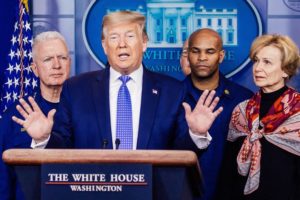
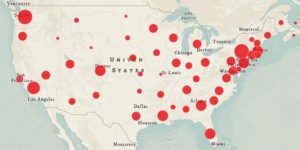
United States Executive Authority Declares Emergency Powers
The last point President Trump’s former attorney Michael Cohen made when he testified last year before Congress was that Trump would never leave office voluntarily. With the pandemic of Covid-19 virus upon us, Trump has the perfect excuse. Last week he declared a state of national emergency. This gives him more than 100 additional powers. He can shut down the Internet, he has already banned gatherings of more than 10 people, and he can send in troops anywhere in the country.
What is the current state of our civil rights and civil liberties?
Guest – Stephen Rohde is a constitutional scholar, lecturer, writer, political activist and retired civil rights lawyer. He is a former President of the ACLU of Southern California and Chair of the ACLU Foundation of Southern California. Mr Rohde has served on the Board of Directors of Death Penalty Focus and was a founder and Chair of Interfaith Communities United for Justice and Peace. He is a past chair of Bend the Arc: a Jewish Partnership for Justice. Mr. Rohde is the author of two books American Words of Freedom: The Words That Define Our Nation and Freedom of Assembly, and co-author of Foundations of Freedom: A Living History of Our Bill of Rights. He has written for American Prospect, Truth Out, Huffington Post, and the LA Times and is a frequent contributor to the Los Angeles Review of Books
—-
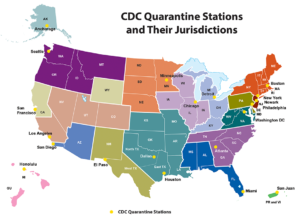
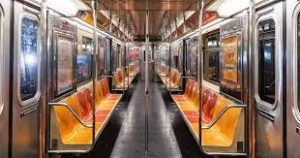
United States Executive Authority in Declaring Emergency Powers
U.S. presidents have the discretion to declare a “national emergency.” As soon as he does, he can sidestep many existing limits to presidential authority. In fact, 100 or more special provisions become available to him. Some provide reasonable responses to real emergencies, while others seem to bolster the power of a so-called unitary executive who wants to amassing or retain power. The president can activate laws allowing him to, for example, shut down many kinds of electronic communications inside the U.S. or to freeze Americans’ bank accounts. Other powers are available without a declaration of emergency, including laws that allow the president to deploy troops inside the country to subdue domestic unrest.
The rationale for having emergency powers is simple: The government’s ordinary powers may not be enough in times of crisis, and amending the laws to provide greater ones would take too long. Emergency powers are intended to give a temporary boost until the emergency passes or there is time to change the law through the regular legislative process. The problem comes when presidents don’t have the best interest of the country in mind.
Guest – Andrew Boyd, Counsel in the Brennan Center’s Liberty and National Security Program. Andrew spent 7 years prosecuting senior Khmer Rouge leaders on behalf of the UN for war crimes, crimes against humanity and genocide. He also worked on cases resulting from the 1994 Rwandan genocide at the International Criminal Tribunal for Rwanda.
————————————————

————————————————
CIA Sponsored Terror, Civil Liberties, Criminalizing Dissent, Human Rights, Prison Industry, Supreme Court, Surveillance, Torture, Truth to Power
Podcast: Play in new window | Download
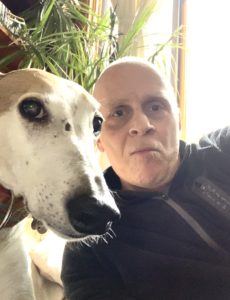

Basic Legal Rights For Animals: Activists and Advocates
Discussions over whether animals are sentient beings, capable of feeling pain, pleasure or suffering, date back as far as ancient thinkers such as Plutarch, Hippocrates and Pythagoras. They all advocated for the fair treatment of animals. The term animal rights stands for the proposition that non-human animals have the right to be treated, not as property, but rather as the individuals they are, with their own desires and needs.
Animal law is now widely taught in law schools across North America. There are 167 law schools in the U.S. and Canada, and 11 in Australia and New Zealand, teaching courses in animal law. Several legal scholars support extending basic legal rights and to personhood to non-human animals.
Critics of animal rights argue that nonhuman animals are unable to enter into a social contract, and thus cannot have rights. Another argument is that animals may be used as resources as long as they don’t undergo unnecessary suffering.
Certain forms of animal rights activism, such as the destruction of fur farms and animal labs by the ALF or Animal Liberation Front, have also attracted criticism, and prompted Congressional reaction by enacting of harsh laws allowing these activities to be prosecuted as terrorism. These laws include the Animal Enterprise Terrorism Act.
Guest – Attorney Tamara Bedic, chairperson of the National Lawyers Guild Animal Rights Project. She is a graduate of the University of Virginia School of Law and a masters degree from Columbia University-NY University. Tamara practices employment law with a focus on women and harassment in the workplace.
Guest – Phillip Murphy, Philip Murphy is a writer and social justice activist based in the Greater New York City area. He is a co-founder of the Buddhist Action Coalition NYC, a pan-Buddhist social justice organization, and is also a co-founder of the New York chapter of UK-based Animal Rebellion, a global climate and animal justice movement. His recent article, Why Animal Justice is Crucial in Addressing the Climate Emergency was published at the independent global media platform openDemocracy.net. SHAC 7 Documentary
——————————–

——————————–





















